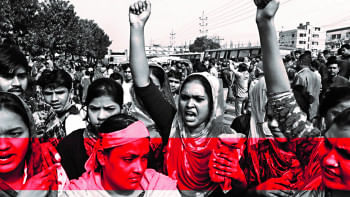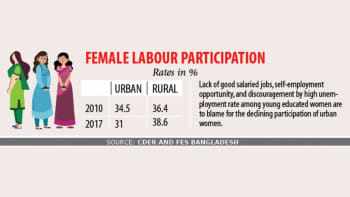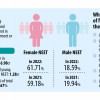When women are left behind, progress becomes stunted

The latest data coming out of the Labour Force Survey (LFS) 2022 paints a worrisome picture for our country's workforce, particularly its women participants. According to the survey findings regarding the state of unemployment in Bangladesh, out of the total eight lakh unemployed graduates in the country in 2022, 3.36 lakh were women. That means the unemployment rate among our female graduates was nearly 19 percent last year—considerably higher than the overall unemployment rate of 12 percent among people with tertiary-level education. The Bangladesh Bureau of Statistics (BBS), which conducted the survey, did note an improvement: the unemployment rate among female graduates decreased in 2022 from 21.4 percent in 2017. But that is mainly driven by more women with higher secondary education participating in agricultural activities in rural areas. In the urban areas, the scenario is grimmer.
This consistently high unemployment rate among women is the result of a number of reasons, which are mainly sociological. It is unfortunate that, in this day and age, our society is still not able to create an environment where our female graduates, who are growing in number every year, can find an equal footing in seeking and acquiring jobs in the service and formal sectors. An array of obstacles—which our male graduates never face—stand in their way, such as family pressure to give up jobs after marriage or after having children, lack of child care facilities at workplaces, lack of a safe, conducive work environment, safety in public transport, etc. These issues also create a bias among recruiters against potential female employees, further compounding the problem. The Covid-induced shock to the country's job market has not helped either.
As a consequence, nearly one-fifth of our educated female population is left out of our workforce. Given proper opportunities, these women could potentially make significant contributions to the country's overall growth. This means a significant number of women are kept from becoming financially independent, which is crucial for them to become empowered.
This state of affairs is not only disappointing, but very concerning. In the journey towards becoming a developed country by 2041, Bangladesh cannot afford to spare any usable resources—be it material or human. We cannot expect to have steady economic growth when a significant part of our educated population is not able to take part in the process. As a society, we need to rethink our priorities and create the required space for our women so that they can take equal part in driving this country's growth upwards.
Follow The Daily Star Opinion on Facebook for the latest opinions, commentaries and analyses by experts and professionals. To contribute your article or letter to The Daily Star Opinion, see our guidelines for submission.


 For all latest news, follow The Daily Star's Google News channel.
For all latest news, follow The Daily Star's Google News channel. 









Comments